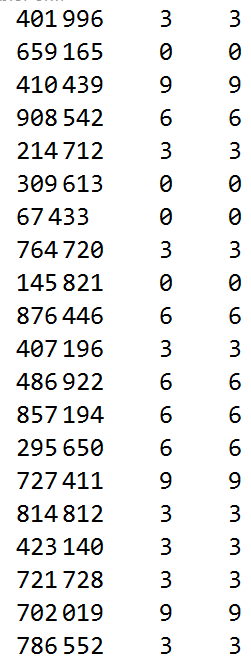Fast algorithm
n = 5566 IntegerPart[10 Mod[7 PowerMod[10, n - 1, 101], 101]/101]
A brute force approach (see also these posts on stackoverflow :) ) may be fine for the current problem, but what if n is a huge number? The only possibility apart from guessing the periodic sequence of numbers as mgamer suggested would be to use modular arithmetics. Let me explain my answer. In contrast to the original post we put the number of interest not in the last digit of the integer part, but in the first digit of the fractional part. Conveniently, the fractional part can be computed as a reminder, or for higher efficiency by PowerMod.
Let us compare the timing of the two methods:
n = 556612345; Mod[IntegerPart[7 10^n/101], 10] // Timing (*{10.447660, 3}*) IntegerPart[10 Mod[7 PowerMod[10, n - 1, 101], 101]/101] // Timing (*{0.000016, 3}*)
The time difference is obvious!
Explanation
Let us consider another example, we compute the n=6 digit of the 7/121 fraction.
n = 6 N[7/121, 30]
0.0578512396694214876033057851240.
In the original post the sought digit is the last digit of the integer part:
N[7 10^n/121, 20]
57851.239669421487603
whereas in my solution it is the first digit in the fractional part
N[Mod[7*10^(n - 1), 121]/121, 20]
0.12396694214876033058 .
It is further used that Mod[a 10^b,c]=Mod[a PowerMod[10,b,c],c].
Reusable function
As requested in the comments, a reusable function can be provided:
Clear[nthDigitFraction]; nthDigitFraction[numerator_Integer, denominator_Integer, n_Integer, base_Integer: 10] /; n > 0 && base > 0 && denominator != 0 := Module[{a = Abs[numerator], b = Abs[denominator]}, IntegerPart[base Mod[a PowerMod[base, n - 1, b], b]/b]]


Mod- one must account for possible non-repeating digits before repeat starts), but not clear if OP needs merit the extra code. It will be orders of magnitude faster when going out millions+ digits, but for less, probably no real advantage over your answer... $\endgroup$